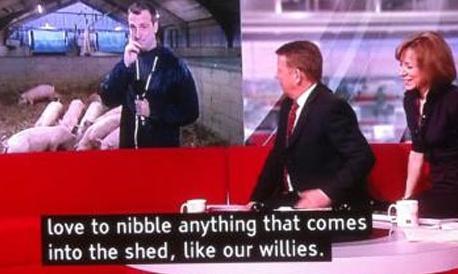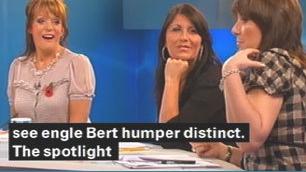Grave, yet amusing
Our five-year-old son’s use of English is coming on in leaps and bounds. A couple of weeks ago, I overheard him talking to his sister and beginning a sentence with: ‘Suffice to say, Emily…’ He’s also described his new winter coat as ‘most accommodating’.
That said, he still makes some funny mistakes. Yesterday he asked for some assistance with one of his Christmas presents:
Harry: Dad, will you help me with my cemetery set?
Me: Cemetery set?
Emily: He means chemistry…
Last term he cut his knee in the school playground and reported later that he’d had to go to the ‘magical room’ instead of ‘medical room’.
And he thinks there’s a type of car called a Vulva. I’m finding it too funny to correct him.
Posted on 28 December 2011
Shoe burglary
An exchange with my seven-year-old daughter this week:
Me: Are you going to wear your new school shoes today, Em?
Emily: No, I think I’ll break into them at the weekend.
Posted on 22 November 2011
Klassic…
A fire station in West Sussex (photo from the BBC website).
Posted on 08 November 2011

Ah, that’s f***ing better
I’ve always found that swearing loudly makes me feel better when something painful happens. (Stubbing my toe on the bedpost, Norwich conceding a last-minute goal, that sort of thing.)
Now there’s scientific proof that this is actually the case.
In his entertaining new BBC1 series on language, polymath Stephen Fry and actor Brian Blessed undergo an experiment to see if they can stand pain for longer when they swear.
This isn’t the highest-quality footage, but it’s the best I could find on YouTube.
Fry’s resistance to pain is increased significantly when he swears – though interestingly, Blessed’s seems to be reduced. Apparently this is because the effect doesn’t work for people who swear all the time; the power of the swear word is diminished by overuse.
A bit of a p*sser for the foul-mouthed, but there you go.
Posted on 16 October 2011
Jar of what?
Ah, I do like a good misheard song lyric – or a ‘mondegreen‘ as it’s sometimes called.
Here is an X-Factor contestant from last night, apparently singing about a jar of farts.
Of course, there have been lots of these over the years. ‘You come to me on a submarine’ from the Bee Gees’ How Deep Is Your Love, for example.
I remember with particular fondness my Mum believing that the Police hit Roxanne was about rock salmon.
And I prefer my younger sister’s rendition of the line ‘It’s something that I must believe in’ from John Paul Young’s Love is in the Air; she thought he was singing ‘It’s something that I must have eaten’, which I think conveys rather well the sick feeling in the stomach that can be caused by love.
My favourite from the last couple of years has to be this one by Preeya Kalidas, though:
‘Watch me while I take a leak’ (0:57)?
Er, no thanks.
Posted on 09 October 2011
Odd indeed
I’m old enough to remember the days before dyslexia and ADHD when schoolkids were simply thick or naughty. (I’m not saying I agree with that; it’s just the way it was back then.)
There are a lot of syndromes and disorders around these days to explain the difficult behaviour of some children, though. I heard about a new one (to me) this week: Oppositional Defiant Disorder.
This describes ‘an ongoing pattern of disobedient, hostile and defiant behaviour toward authority figures which goes beyond the bounds of normal childhood behaviour’. (Thanks, Wikipedia.)
Sounds serious. So it might have been better to give the condition a name which didn’t get abbreviated to ODD.
Posted on 10 September 2011
Missing the charabanc
Lexicographers at Collins Dictionary have just released a list of words they have deemed to be extinct and which they intend to drop from their smaller dictionaries.
In some cases, it’s fair enough; there are plenty of words on the list that I’d never heard of. Such as ‘succedaneum’, which apparently means ‘something used as a substitute’.
Or ‘wittol’, a man who tolerates his wife being unfaithful. (Now largely superseded by ‘mug’.)
But there were a couple of surprises. ‘Aerodrome’ is on the list. As is ‘charabanc’.
Unusually, I can remember exactly when I first came across the latter. It featured in the Stranglers’ 1977 hit ‘Peaches’, in a delicate, wistful lyric about a moment of misfortune in a seaside town:
‘Oh shit, there goes the charabanc.
Looks like I’m going to be stuck here the whole summer.
Well, what a bummer.’
And though I don’t think I’ve ever used the word myself, it has cropped up every now and then. I’m sure characters on Coronation Street have occasionally spoken of taking the ‘chara’ to the coast.
I don’t want to brabble1 with the linguistic experts at the dictionary, but I fear that this omission may leave them looking like ludibrious2 hoddypeaks3.
1To quarrel over a trifle 2Apt to be the subject of mockery 3Fools or blockheads
Posted on 24 August 2011
Combing the giraffe
It’s not long now until our holiday in France, so I’ve been trying to breathe some life into my dormant French. As part of my preparations, I’ve been dipping into the rather absorbing Collins Easy Learning French Idioms.
It’s a compilation of expressions which offer a fresh and different way of looking at life – and in some cases, death.
Well, I say ‘fresh’; for all I know, they may be considered hackneyed in France, but most of them are new to me.
A few of my favourites:
Revenons à nos moutons! (lit: Let us return to our sheep) = Let’s get back to the subject
Arriver dans un fauteuil (lit: To arrive in an armchair) = To win easily
Être soupe au lait (lit: To be milk soup) = To have a short temper, to flare up quickly
Se mettre sur son trente et un (lit: To put oneself on one’s 31) = To get dressed up to the nines
Manger les pissenlits par la racine (lit: To eat dandelions by the root) = To push up daisies
My wife is sceptical to say the least that my efforts will be of any practical use in France. She thinks that I’m wasting my time – or as the French would say, que je peigne la girafe.
Posted on 29 July 2011
The Generation Game
At the Ledbury Poetry Festival earlier this month, poets were invited to name the words and phrases which, in their opinion, have become annoyingly empty clichés.
The Guardian listed some of their responses, which included: ‘Thinking outside the box’; ‘Devastated’; ‘Awesome’; ‘Literally’; and ‘LMAO’.
Obviously I wasn’t asked, but the meaningless phrase which has got on my nerves lately is ‘in/for a generation’.
It seems that leading politicians are now incapable of making a statement without working it in somewhere.
A few recent examples will suffice to make the point:
David Cameron on the Budget: “the most pro-growth budget this government, this country has seen for a generation”.
On the drought in East Africa: “What we are seeing today is the most catastrophic situation in that region for a generation.”
Nick Clegg on the AV referendum: “Change in the way we do our politics comes along once in a generation.”
On the phone hacking scandal: “I think that we now have a once-in-a-generation opportunity to really clean up the murky practices.”
Ed Miliband on the reform of care for the elderly: “This is a once-in-a-generation opportunity which our generation must address.”
On the challenge facing Labour: “To go from losing a majority at one election to regaining a majority at the next is something that no political party has achieved for a generation.”
Really, the words ‘a generation’ are just a fancy way of saying ‘ages’.
I still remember a comprehension exercise I did at school when I was 11. One of the questions following a passage of text asked why a character had used a particular word. I can’t recall the word, but my answer was along the lines that the character thought it was long and impressive, and he would sound sophisticated and intelligent if he used it.
The answer was marked wrong, but I still think I was right. And I think that these politicians – and some political commentators – persist in using ‘a generation’ for the same reason.
Posted on 21 July 2011
Art interlude
This blog is supposed to be about words rather than pictures. But since this is definitely a case of a picture painting a thousand words, I’m posting it anyway.
It’s a portrait of me, drawn by our four-year-old son Harry this week. General consensus in the house is that it’s captured my disposition perfectly.
Mr Sunshine, c’est moi.
Posted on 17 June 2011

OMG, OED
Apparently, the Oxford English Dictionary has included the acronyms OMG, LOL, TMI, BFF and IMHO in its latest update.
FFS.
Posted on 20 May 2011
The War on Error
Osama Bin Laden was killed this week, and already the conspiracy theories have started.
Not just about whether he’s really dead (since his body was quickly buried at sea and the US government has refused to release photographs of his corpse), but about whether this caption on Fox40 News in Sacramento – a Fox News affiliate – was deliberate or just a typo:
Posted on 05 May 2011

A new urbaddiction?
There’s an interesting article in the Guardian today about the Urban Dictionary. I’ve stumbled across the site now and again, but hadn’t realised how large it is; while the Oxford English Dictionary has around 600,000 entries, the Urban Dictionary has 5.7million.
A lot of the entries are simply made up – frequently by youngsters having a laugh, frequently at the expense of people they know – but there is plenty of cleverness and inventiveness in evidence. Here are some of my favourites on the site:
Store d’oeuvres – free food samples given out by supermarket staff
Treebook – a book made of paper; a predecessor to the ebook
Buysexual – someone who derives sexual pleasure from the act of shopping
Googleheimer’s – the condition of thinking of something you want to Google, then forgetting about it when you get to your computer
Shelf esteem – confidence derived from a collection of self-help books
Beardo – a weirdo with a beard
They’re enough to give logophiliacs a neologasm.
Posted on 21 April 2011
Cento parole
For ages now, my wife has been expressing the view that Fabio Capello can’t possibly be able to deal effectively with the national football squad since his English still isn’t great. It’s only relatively recently (well, since England’s dismal showing in last year’s World Cup) that the opinion has been more widely expressed.
Capello felt obliged to defend himself against the charge again this week – and in doing so, made the surprising claim that only 100 words were needed to get his messages across to the team.
It reminded me of an old football joke:
The day after signing a new striker from a foreign country, the manager assembles the first team on the training ground. He holds up a ball, points towards the goal and repeats slowly: ‘Ball – kick – goal. Ball – kick – goal.’ Eventually one of the players raises a hand.
‘Gaffer,’ he says, ‘actually Goran can speak really good English.’
‘This isn’t for Goran’s benefit,’ replies the boss. ‘It’s for the rest of you bloody lot.’
But does Capello’s argument hold water? I’ve had a go at identifying the hundred words which he could use to manage the England team…
| early | doors | back | stick | welly | launch | row Z | easy-ozy | squeeze | pressure |
| get | rid | up | his | arse | put | it | in | the | mixer |
| use | your | area | stop | bunching | hit | channels | who’s | got | their |
| runner | man | on | square | ball | captain | toss | onion | bag | triangles |
| blinder | mare | reducer | hole | for | fun | second | phase | pull | strings |
| handbags | big | guy | nutmeg | hold | knockdown | fucking | hell | no | showboating |
| lads | one | of | you | test | keeper | good | delivery | play | percentages |
| well | done | my | son | end | product | give | and | go | ballwatching |
| have | his | legs | fill | box | TIME!!! | challenge | step | hospital | pass |
| do | we | want | this | someone | support | him | AWAY!! | OUT!! | bollocks |
Actually, those might well be enough.
Posted on 30 March 2011
For sale: wetsuit never wet from the inside
Once again, proof of the selling power of words.
Some time ago, I mentioned an ad on eBay for a pair of leather trousers which attracted an extraordinary amount of attention because it was written in a very funny way.
A similar thing has just happened again. This ad for a secondhand wetsuit has, at the time of writing, received over 650,000 hits – and the winning bid was an astonishing £8,999. (In the end, the wetsuit came with a large number of extra items provided by companies who heard about the ad and wanted to get involved.)
Since ads on eBay don’t stick around for too long after the auction has closed, I’ve copied and pasted the main text below. It’s a great lesson in how to engage and entertain your audience while talking about your product; if I were a creative director at an ad agency, I’d be trying to get in touch with the author to offer him a job. Read and enjoy…
I bought this wetsuit brand-new last year and have worn it a fair bit. When I say ‘fair’ I reckon about 20 times, but then probably more like 30. A fair few times anyway.
HOWEVER you will like this, If it was not being worn, it was hung on a hangar or rolled to prevent creasing AND I rinsed it in fresh water after EVERY session so it’s in VERY good condition as I look after my gear, I always do, similarly I take care of my body and shower at least once a day and always moisturise. Yes you’re probably getting a feel for the kind of man I am. You can see from the pictures it has no creases and looks lovely. My friend Gaz has got a wetsuit that he doesn’t look after and it looks like an Elephant’s arse, all wrinkled, a bit like an old man’s testicle.
You’re probably thinking “People p*ss in wetsuits, I’m not sure about a secondhand wetsuit”, but believe it or not I have NEVER urinated in this suit, seriously, these suits are too good to be doing such a vulgar act in, the wee just ends up staying in the suit and then when you’re sat having a post-surf pint in the pub you smell awful and girls don’t like boys that smell of p*ss so you just sit alone all night, sobbing into your pint of Betty Stoggs like a lonely desperate p*ss smelling man.
I’ve included a picture of a bear using a urinal, this is how I normally use the toilet, notice that the animal is not wearing a wetsuit. Although I am not a bear, I, like a bear, do not p*ss in wetsuits.
It’s a size medium or “m”, it was the top of the range suit when I bought it, I think I paid around £300 for it, still a great warm suit that will make you surf at least 200% better. It won’t really but it will keep you warm and it’s flexible so you’ll be able to throw your arms around like Beyonce whilst you’re bouncing along a wave.
People will look at you and say “f*ckin hell check that dude out, he knows what he’s doing wearing one of those Xcel suits and he’s got some fresh dance moves”. They probably won’t say this.
Now as it’s been worn, there’s some signs of wear around the neck, which I’ve taken pictures of, so you don’t say “oi you c*nt, there’s area of wear around the neck I’m giving you bad feedback”. The pictures make it look worse than it is (because they’re close-ups), and I’ve taken the pictures with the suit turned inside out, when it’s the right way round you don’t see the wear and it has no effect on the performance of the suit. That was a bit boring wasn’t it, but it had to be done so you can’t take me to eBay court for not being honest with you.
Why am I selling it? Well I’ve just bought a new one, as I’m a flash tw*t like that, I tend to get a new suit every season, I just like the feel of fresh neoprene on my soft skin, and well to be honest I could do with some cash to pay for prostitutes. No, that was a joke, now you’re going to think the suit is riddled with disease but it’s not as I was joking I do NOT engage with ladies of the night.
I’ll post it out the next working day following cleared payment, or if you’re around the Truro area you can come and collect it thus avoiding postage charges. Having said that, if you’re a maniac, maybe you should just let me post it to you as I don’t want to be murdered to death, especially as the summer is just beginning! WOO HOO.
Any questions just ask, I’ll answer them very quickly as I’m sat at a computer all f*cking day, unless there’s waves.
Oh, and the author’s set up a follow-up website: www.bearsdontwearwetsuits.com
Posted on 24 March 2011

Nibbling willies
Since I don’t have a problem with my hearing (my wife may disagree, though it’s actually a failure to listen that annoys her), I’ve never had occasion to turn on the subtitles when watching TV. However, it turns out that I’ve been missing out on a constant stream of amusing linguistic slips.
This came to light this week when the Guardian ran a piece about a subtitle which appeared on BBC Breakfast. A reporter on a farm told the studio that ‘pigs love to nibble anything that comes into the shed, like our wellies’ – but the words on screen said… oh, see for yourself:

A quick search revealed that the writer of the Guardian article, Charlie Swinbourne, wrote about subtitle slips for the BBC website in November 2008. You’ll find some more great examples there, such as the players and staff of Arsenal and Man Utd marking the fact that the following day was Remembrance Sunday:

And while I knew US presidential candidate John McCain was old, I hadn’t realised he was that old:

As for Engelbert Humperdinck…

If you check out the article, don’t forget to take a look at the comments attached to it to see what the Archbishop of Canterbury was once called…
Posted on 18 January 2011
Bloody repeats…
It’s something of a Christmas tradition for TV companies to fill out their festive schedules with repeats, usually introduced with the phrase: ‘Another chance to enjoy…’
In the spirit of the season, then – as well as out of laziness – here’s another chance to enjoy a blog entry from December 2008…
Grimm indeed
Seems even Santa is now sourcing his goods from cheap factories in the Far East to keep his costs down. When my daughter Emily went to see him at Hampton Library last week, he gave her a Snow White theatre game that had been made in China with rather less attention to quality and detail than the spectacle at the Beijing Olympics.
Most of the figures tore and disintegrated when Emily tried to press them out of the flimsy sheets of card, and eventually she abandoned all attempts to assemble it. I fared no better when I tried to help – but on examining the box to see if there were any useful instructions (there weren’t), I did find a beautifully written synopsis of the Snow White tale.
I thought I would share it with you here; consider it a Christmas gift…
German writer brother Green (Jacob and Willhelm Grimm) collects old legend and folktale since 1806, the untiring efforts to go through decades, finished the immortal monument al work “Green’s fairy tale” in 1857 at last. “sow white” issued it in 1812, was one of the masterpieces of “Green’s fairy tale”. The beautiful snow white suffers the stepmother’s jealousy and persecution, but turn danger into safety again and again. She and seven little short persons become the good friend, the prince and becoming his bride with handsome adventure finally. Theater this can copy snow white and seven little short person happy life in forest, in this pleasant fairyland, there are small and exquisite and lovely rooms, beautiful snow white, naughty little kind hearted short people.
But perhaps I’m being too harsh on the manufacturers. After all, it does appear that the educational value of the game is very important to them:
The game will beneficial for kids in many aspects. It will coordinate children’s movements of hands and brains, stimulate their distinguishing ability of vision, establish their imagination and cultivate their expression ability.
Merry Christmas, everyone.
Posted on 21 December 2010
News: Student fails to get sh*tfaced
Regular readers of this blog (anyone?) may recall the failure earlier this year of two Countdown contestants to spot a rude word in one of the letters rounds. (Starts with ‘f’, rhymes with bucked.)
Now it seems that a round has had to be dropped from a recently-recorded show because one of the contestants did find a word that was considered too strong for the afternoon audience. (Perhaps the programme makers didn’t want to risk getting carpet cleaning bills from old biddies around the country after they’d sprayed out a mouthful of tea in shock.)
The selection of letters was DTCEIASHF – and the contestant in question (a student from Cambridge) made the word ‘shitface’.
It’s a valid word; it’s in the Oxford English Dictionary. But it’s a mystery why the student didn’t use the ‘d’ to make the nine-letter word ‘shitfaced’. What on earth do they do at universities these days?
Meanwhile, there was a cracking contribution to the letters page of the Guardian yesterday. It was a response to the news that the Royal Navy and French Navy are to work more closely together:
The Anglo-French navy needs a rousing motto. In English, “To the water, this is the hour”; or in French (said loudly for full effect), “A l’eau, c’est l’heure”. – John Palmer, Horndean, Hampshire
My wife, a French teacher, had to say it out loud three times before she got it…
Posted on 06 November 2010
Linguistic links
Once again, I’m afraid that being short of time means I’m going to have to short-change you with a post consisting of links rather than my own sharply-observed insights and penetrating analysis (ahem).
I think they’re pretty good links, though.
The first is a belter. Here’s Euro MP Rachida Dati, formerly French Justice Minister, committing an unfortunate slip of the tongue when interviewed recently about investment funds (ignore the title at the top of the picture).
What she says here translates as: ‘I see some looking for returns of 20 or 25 per cent at a time when fellatio is close to zero.’ (She uses the word ‘fellation’ instead of ‘inflation’, inevitably provoking speculation as to what she was thinking about at the time.)
Next, here’s polymath (and, I’m proud to say, fellow Norwich City fan) Stephen Fry talking about language and linguistic pedantry. To be honest, I found the animated typography here a little irritating after a while, but the clip is still worth watching for Mr Fry’s own way with words:
Finally, here’s an old clip from an early series of A Bit of Fry and Laurie, in which the two of them spoof learned linguistic discussions between intellectuals on TV.
A wonderful use of our language, tiger, our language.
Posted on 20 October 2010
Best Use of Copy (seen this week, anyway)
Sometimes one word is enough.
The singer George Michael has just been sentenced to eight weeks in prison, following an incident when he crashed his car into a branch of Snappy Snaps while under the influence of cannabis. Here’s what a bright spark wrote on the wall he hit:

Posted on 16 September 2010
Flat-out cop-out
I’m afraid I’ve too much work on at the moment to write a proper blog post, so here are links to three other language-related items:
– David Mitchell looks at the language used on signs. The phrase ‘polite notice’ comes in for particular criticism.
– Charlie Brooker considers the catchy and effective phrases devised by right-wingers to deride their opponents. Or the Loony Left, as they would call them.
– An article from the Wall Street Journal website looks at research which suggests that language profoundly influences the way we see the world. It sounds like a dry read, but it’s actually surprising and fascinating. In fact, if you’re busy too and only have time to click on one of these three links, I’d make it this one.
Normal posts will, I hope, be resumed shortly.
Posted on 06 September 2010
Oo-er, Minister…
Maybe it’s just me, but here’s a press statement which I think could have been worded better.
The Prisons Minister Crispin Blunt has just announced that he is gay, and has separated from his wife. According to his office:
“He decided to come to terms with his homosexuality and explained the position to his family.”
Wonder if he used diagrams?
Posted on 28 August 2010
French letter embarrassment
We’ve just got back from an enjoyable week’s holiday in France, where I think I coped with the language pretty well overall. Apart from one clanger, that is…
I was talking to a French friend of my wife’s that we visited one day, and mentioned that the cottage where we were staying seemed to have a lot of flies. I wanted to say that this was possibly because the owner of the property had a ‘fosse septique’ – that is to say, a septic tank. What came out of my mouth, unfortunately, was ‘fesse septique’. I had inadvertently suggested that he had a septic buttock.
I didn’t notice as many odd or funny shop names as in previous years, though I did spot a clothes shop called ‘Jet 7’ (you have to say it in French to get it) and a clothing stall in the market place at Niort called ‘Vêtements Moron’. Apt as this sounds for me, I didn’t buy anything there.
We had a laugh in the car on the way home, though. Approaching the toll barriers on a motorway, I said I’d make sure to head for the manned booths.
“‘Man boobs’?!” exclaimed our six-year old daughter in the back.
Posted on 16 August 2010
Och nae, the noo!
We’re just back from a couple of days up in Edinburgh, which was a very enjoyable and relaxing stay – if not a quiet one, thanks to the bagpipe-playing buskers on every corner and a similar racket blaring out from most of the gift shops.
There are one or two language-related snippets to report:
– Close to Edinburgh Castle, there’s a shop with one of the most cringeworthy names I’ve seen for a long time:

Mind you, that’s arguably not as bad as something I spotted when my wife dragged me into Harvey Nichols. The top level of the store is called the ‘Forth Floor’. You’d think they’d know better.
– Meanwhile in Debenhams in Princes Street (much more to my taste, at least as far as the prices are concerned), there’s a sign on the wall behind the cash registers that reads: ‘Please pay her’.
Maybe not as funny/alarming as the sign with a missing letter I once saw in a Wicklow hotel (‘Baby hanging room’), but there you go.
– I was momentarily thrown (figuratively, not literally) by the waitress who took our dinner order at the hotel where we stayed. ‘Is that you?’ she asked when we’d told her what we wanted. Of course it’s us, I thought – then realised that she meant ‘Is that everything you’d like?’
– One of the original Bay City Rollers is apparently embroiled in some sort of legal battle. At least, that’s what I deduced from the headline on the front page of one of the local papers: ‘SHANG-A-LANG-A-LAWSUIT’.
Posted on 31 July 2010
Beyond the Palin
Sarah Palin, the 2008 Republican Vice-Presidential candidate whose claim to foreign policy experience was that Alaska (the state of which she was Governor) is close to Russia, has been in the news again this week.
First she called on Barack and Michelle Obama to ‘refudiate’ suggestions that the Tea Party movement was racist. Then, on Twitter, she called on ‘peaceful Muslims’ to ‘refudiate’ plans to build an Islamic centre near the site where the World Trade Centre stood in New York. Mockery ensued, but she tried to defend her slip in another tweet:
“English is a living language. Shakespeare liked to coin new words too. Got to celebrate it!”
She is of course correct in saying that our language is always changing and renewing itself, and that Shakespeare invented many new words. All the same, I can’t help feeling that she has overlooked a subtle but crucial difference.
Shakespeare wasn’t a f*cking idiot.
Posted on 20 July 2010
My writing style is like… awesome!
I’ve just come across a website which claims to be able to tell you which famous author you resemble in terms of writing style. You enter a sample of your work in the space provided, click the button and the website analyses it in an instant before giving you the result.
I couldn’t resist having a go, so I entered a couple of paragraphs from my book Bald – and the verdict was that I write like David Foster Wallace.
I have to confess that I’d never heard of him, so I looked him up online. It turns out that he was a novelist and essayist described by the New York Times as ‘a writer of virtuosic talents who can seemingly do anything’. His novel Infinite Jest was named by Time magazine as one of its all-time top 100 novels.
Sounds good, I thought. I’ll take that.
Then I tried entering this on the website to see what happened:
Aga-doo-doo-doo, push pineapple, shake the tree,
Aga-doo-doo-doo, push pineapple, grind coffee.
To the left, to the right, jump up and down and to the knees,
Come and dance every night, sing with a hula melody.
That’s like Vladimir Nobokov, that is.
Posted on 13 July 2010
Respect…
One of the trickier jobs I’ve had recently has been the devising of a new overall theme for the code of conduct at the school where my wife works. Blimey, talk about a tough client…
It took rather less time to come up with a theme than it did to convince my wife that it was a half-decent idea. Eventually, though, she bought it: ‘Give respect, get respect‘.
She then had the task of selling it to all the interested parties at her school. And she did a fine job – except that on its journey through the approval system, the line was given a bit of a tweak before it emerged at the other end. Apparently some teachers thought that the word ‘get’ suggested an excessive degree of entitlement on the part of the students, and proposed ‘gain’ instead. This, they thought, conveyed a sense that respect has to be earned over time.
I didn’t share their view, but there was nothing I could do about it. Besides, I thought, it was possible that I might be in a minority of one.
And then our six-year-old daughter Emily came across a printout of the new code of conduct at home. “What’s this?” she asked.
My wife duly explained. Emily looked hard at the printout for a while, looking thoughtful. Then she offered her opinion.
“It should say ‘get respect’, not ‘gain respect’,” she said. “That would sound a lot better.”
I could have kissed her. Actually, I did.
Posted on 03 July 2010
Very funny, very
Just lately, our son Harry (aged 3) has developed a sentence structure designed to add emphasis to a particular word or phrase. He simply repeats the key element at the end. For example:
“I want two sausages, two.”
“I want to scoot to the playground, scoot.”
…and of course…
“Emily did it, Emily.”
It reminds me a bit of the French construction which places a personal pronoun at the start of a sentence for emphasis or clarity: “Moi, j’aime cette maison.” (= ‘I like this house)
It’s unspeakably cute when Harry comes out with one of these (obviously I may be slightly biased, being his dad), but it’s also very catchy, very. His mother and I have taken to using the construction ourselves, as in:
“I’m just going to get the paper now, the paper.”
“You’ve got a hole in your sock, a hole.”
Let’s hope for the sake of everyone around us that we manage to stop doing this when Harry does, Harry.
Posted on 14 June 2010
Restricted viewing
There’s an interview on the BBC website today with former HomeSecretary Jacqui Smith.
In it, she talks about the aftermath of the infamous expenses claim she made for two, ahem, adult films bought by her husband Richard. Apparently he had to ‘literally stay in the house with the curtains drawn for weeks on end’.
You’d think he’d be used to that.
Posted on 20 May 2010
Parlez-vous Globish?
During the brief history of this blog, I’ve mentioned the demise of a couple of languages: Livonian and Bo. Today, though, I’ve learned about a new language which is growing fast: Globish.
Globish is a highly simplified version of English with a vocabulary of only 1500 words and much looser grammar. It’s used by non-native English speakers to communicate with each other, mainly for business purposes. And it’s been formalised by a non-native English speaker: Jean-Paul Nerrière, a former IBM executive from France.
It enables business people from, say, Korea, Sweden and Brazil to understand each other very well. Funnily enough, though, people from Britain, Australia and the US cannot participate easily since their English is too subtle and complicated to be understood.
Even a word like ‘kitchen’ would not be understood by Globish speakers; they would say ‘the room where you cook food’. Similarly, ‘siblings’ would be replaced by ‘the other children of my mother and father’.
Globish is already so widespread and so powerful that Nerrière has predicted that “(it) will limit the influence of the English language dramatically”. I’m not sure that’s true; I’d have thought that English is so rich, so widespread and has such history that it will more than hold its own. The languages most at risk of serious damage are more likely to be the likes of Livonian and Bo.
But then, I’m no expert. If you want the opinion of someone who is, Robert McCrum (Associate Editor of the Observer) has just published a book on the phenomenon.
Posted on 09 May 2010
Do they sell those in Ann Summers?
Every day at his pre-school, our son Harry has to take in an object beginning with the letter of the week. Sometimes it’s been a bit of a struggle to find something new – especially recently, when we’ve had X and Z to contend with – so it was quite a relief when we finally completed the alphabet last week.
Only to discover that we’re now starting with A again. Grrr.
Today he took in a book called ‘Arnie the Accidental Hero’, about a timid armadillo. ‘That’ll do,’ I thought. ‘In fact, that’s quite a good one.’ Except that when I picked him up, one of the helpers informed me that Harry called it an ‘armadildo’.
Still, at least he seems to be doing well with his French. The other day he told me he knew the word for ‘sweets’, and to prove it he ran around shouting: ‘J’aime les bumbums! J’aime les bumbums!’
We’re so proud.
Posted on 04 May 2010
The election campaign, in three words…
The General Election campaign is now well under way and the three main parties have been busy trying to get their messages across. On occasions, though, they haven’t done it with much subtlety. Each leader has taken to repeating a particular word again and again and again to drive it home.
When launching the Labour manifesto, Gordon Brown used the word ‘future’ no less than seventeen times.
David Cameron said ‘change’ thirteen times in a Conservative party political broadcast.
And I counted eighteen instances of ‘fair’ in a Lib Dem broadcast presented by Nick Clegg.
Now these words may provide a decent summary of each party’s position. Labour’s ‘future’ says ‘don’t think too much about what we’ve done in the past’. The Tories’ ‘change’ says ‘we’re not them’. And ‘fair’ is the Lib Dems’ way of suggesting a balanced position in the centre.
But to keep repeating these words suggests, I think, a patronising attitude towards the public which you would think politicians would want to avoid after the expenses scandal. It’s as if they think we are so stupid that we will see their parties in a certain way if they say a certain word often enough.
It’s like Kellogg’s trying to convince us that Bran Flakes are tasty with their ‘tasty, tasty, very very tasty’ jingle. And that didn’t work.
Posted on 22 April 2010
This week on Countdown…

Er… f*cked if I can see anything.
Posted on 25 March 2010
Urgently reqwired…

I spotted this job ad on the Drum website over the weekend. Looks like the successful candidate can’t start soon enough.
Posted on 08 March 2010
That’s not my name
Our son Harry (3½) is showing a lot of interest in words at the moment, so we got the set of plastic letters out yesterday.
I spelled out ‘K-E-V-I-N’ and asked him what it said.
“Umm… I don’t know,” he replied. I pointed to myself to give him a clue.
“Is it ‘Daddy’?” he asked.
“No, it’s what you sometimes call me when you’re being a bit cheeky.” A pause.
“Ah, I know! ‘Noodle Doodle’!”
Posted on 02 March 2010
A construction unusual
The Labour Party has just unveiled its slogan for the election campaign: “A future fair for all”
Last one on the dodgems is a loser! Hope I win a goldfish!
Posted on 26 February 2010
A large dollop of catch-up
Apologies for the lack of posts lately; I’ve been rather busy, though with painting more than writing. (The kitchen and the front room, rather than portraits or abstracts.) This should bring us up to date, though…
• I didn’t win the Columnist of the Year award which I mentioned a couple of posts ago. (You may have guessed as much; after all, I’d have been on here gloating about it before now if I had been victorious.) Still, I did get a Highly Commended certificate. And the chap who won was apparently a regular columnist for the Independent for fifteen years, which suggests that he knows what he’s doing.
• Another language has gone the way of Livonian, the demise of which was discussed on this blog last year. This time it’s the language of Bo, on the Andaman Islands in the Bay of Bengal. Another sad linguistic event – but I did smile at one of the comments added to the Guardian’s report.
“Damn, I’ve just bought the Bo Linguaphone CDs.”
• I learned (a year after the event!) that Birmingham City Council has banned the use of apostrophes on all its signs. The reasons they gave for this move were that their staff were spending too long dealing with complaints from the public about poor punctuation, and that it would cost too much to make all the signs correct. Doing away with the apostrophe altogether was seen as the simplest solution.
That’s Birmingham’s prerogative (or rather, thats Birminghams prerogative), but it really can’t be condoned. As John Richards, founder of the Apostrophe Protection Society, commented:
“This is setting a terrible example. It seems retrograde, dumbing down really. All over Birmingham, and in other cities, teachers are trying to teach children correct grammar and punctuation. Now children will go around Birmingham and see utter chaos… If you don’t have apostrophes, is there any point in full-stops, or semi-colons, or question marks? Is there any point in punctuation at all?”
(Yes, there’s an Apostrophe Protection Society. No, I’m not a member.)
• Last weekend, the Guardian and Observer published guides to better relationships. Part one included an interview with Dr John Gottman, a leading counsellor of couples, in which he described how analysis of language can give clues as to the state of the relationship:
“Generally you can pick it up… I remember one woman who said: ‘I think a woman needs two lovers, one who will repair things around the house and another to satisfy her sexually. Unfortunately Norman is not good at either of them!’ Now it was pretty easy to tell that she was contemptuous of her husband, because she said so directly.”
Sure about that, Sherlock?
• There’s been a big fuss this week about a Twitter message allegedly sent by Labour MP David Wright, which said: “ivenevervotedtory because you can put lipstick on a scum-sucking pig, but it’s still a scum-sucking pig…”
The Tories have taken particular exception to the phrase ‘scum-sucking’ (which Wright claims was inserted in his tweet by someone else), but the use of ‘pig’ seems to have been overlooked.
Isn’t that a bit like being called fat and stupid, and responding with ‘Here, I’m not fat!’?
• Bad spelling can lose you your job. The general manager of the Chilean mint has been fired after it was discovered that the name of the country has been misspelled on thousands of 50-peso coins; it reads ‘Chiie’ instead of ‘Chile’. It took a while for anyone to notice, though – the coins were issued in 2008, but the error only came to light at the end of last year.
• The Winter Olympics are taking place at the moment. The good news: I haven’t heard a commentator use the word ‘medal’ as a verb yet. The bad news: they’re using ‘podium’ as a verb instead (e.g. ‘He podiumed at the last Olympics’).
• And finally, Geri Halliwell introduced herself and Mel B at the Brit Awards this week as ‘the two most naughtiest Spice Girls’.
She’s had books published, you know.
Posted on 19 February 2010
The filth and the furry
It was reported this week that a long-established Canadian magazine is changing its name because its e-mails and newsletters keep getting blocked by Internet spam filters. Its name: ‘The Beaver’.
I wonder whether my favourite ornithology magazine, Cocks and Tits Monthly, will follow suit.
(Sorry, couldn’t resist that.)
Posted on 14 January 2010